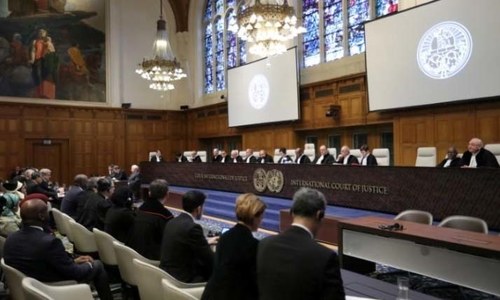THE HAGUE: An international case accusing Myanmar of genocide against the Rohingya ethnic minority returns to the United Nations’ highest court on Monday amid questions over whether the country’s military rulers should even be allowed to represent the Southeast Asian nation.
Four days of public hearings at the International Court of Justice start Monday into Myanmar’s preliminary objections to the case that was brought by Gambia, an African nation acting on behalf of an organisation of Muslim nations that accuses Myanmar of genocide in its crackdown on the Rohingya.
In August 2017, Myanmar’s military launched what it called a clearance campaign in Rakhine state in the country’s west in response to an attack by a Rohingya insurgent group. The campaign forced more than 700,000 Rohingya to flee to neighbouring Bangladesh and led to accusations that security forces committed mass rapes and killings and burned thousands of homes.
Gambia argues that the campaign amounted to a breach of the genocide convention and wants the court to hold the country responsible.
The figurehead who led Myanmar’s legal team in court last time there were public hearings in the case the nation’s ousted leader Aung San Suu Kyi is in prison after being convicted on what supporters call trumped up charges.
Opponents of Myanmar’s military rulers say they have appointed two officials to the country’s legal team at the UN top court who are the subject of international sanctions.
Critics of the military rulers say that the National Unity Government a shadow civilian administration should be representing the country at hearings in The Hague. The group says it has appointed an acting alternate agent, U.N. Ambassador Kyaw Moe Tun, and says it’s withdrawing the country’s preliminary objections.
This is a shameful double-whammy. Myanmar is being represented at the ICJ by people sanctioned for gross human rights abuses and violating the rule of law,” said Chris Gunness, director of the Myanmar Accountability Project. But in any case, this illegal junta should not be representing Myanmar, it should be the NUG.
The court didn’t respond to a request for comment on Myanmar’s representation at the hearings.
“What’s really important here is that ... if it is the junta thats in court, this is not something that should be taken to confer legitimacy on the junta,” said Akila Radhakrishnan, president of the Global Justice Centre.
At public hearings in late 2019, lawyers representing Gambia showed judges maps, satellite images and graphic photos to detail what they called a campaign of murder, rape and destruction amounting to genocide perpetrated by Myanmar’s military.
That led the court to order Myanmar to do all it can to prevent genocide against the Rohingya. The interim ruling was intended to protect the minority while the case is decided in The Hague, a process likely to take years.
Since that ruling, the military has seized control of the nation.
The takeover prompted widespread peaceful protests and civil disobedience that security forces suppressed with lethal force. About 1,500 civilians have been killed, according to the Assistance Association for Political Prisoners. Earlier this month, the UN Security Council called for an immediate halt to violence throughout Myanmar and reaffirmed support for the country’s democratic transition and democratic institutions.
Published in Dawn, February 21st, 2022













































